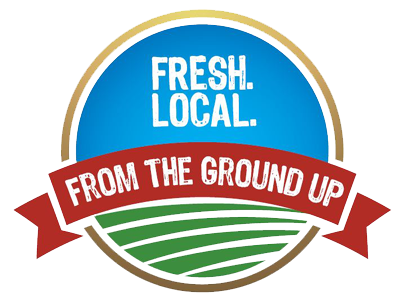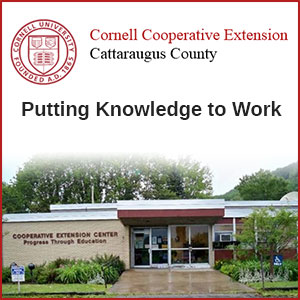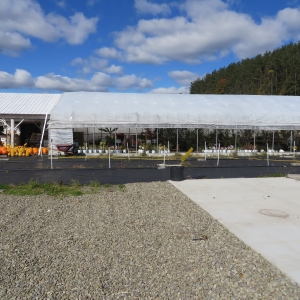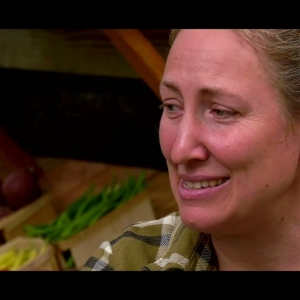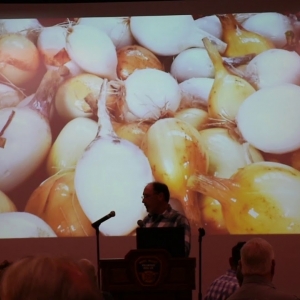Other Ag News:
(Washington, D.C., May 19, 2025) – U.S. Secretary of Agriculture Brooke L. Rollins visited Nebraska with Governor Jim Pillen, Representative Adrian Smith, and Agriculture Director Sherry Vinton to tour Cargill Bioscience Complex, Wholestone Farms’ pork processing facility, and Ohnoutka family farm in addition to hosting a Farmers First roundtable and rolling out the Farmers First: Small Family Farms Policy Agenda to improve the viability and longevity of smaller-scale family farms for generations to come.
(Omaha, N.E., May 19, 2025) – U.S. Secretary of Agriculture Brooke L. Rollins today signed the first-ever waiver to amend the statutory definition of food for purchase for Nebraska’s Supplemental Nutrition Assistance Program (SNAP). Effective January 1, 2026, taxpayers will no longer be subsidizing the purchase of soda or energy drinks in the State of Nebraska.
(Omaha, NE, May 19, 2025) – After nearly 100 days of traveling the nation and visiting directly with hundreds of farmers across America, U.S. Secretary of Agriculture Brooke L. Rollins today released the first set of policy proposals under her newly launched Make Agriculture Great Again Initiative. These initial proposals (PDF, 7.2 MB) are a comprehensive set of policy solutions aimed at improving the viability and longevity of smaller-scale family farms for generations to come.
Each May, the United States celebrates World Trade Month, a time to reflect on the vital role international trade plays in our economy, particularly in the food and agriculture sector. The Trump Administration remains committed to expanding agricultural exports, recognizing the progress made and the challenges ahead. Exports are a pillar the U.S. farm economy, with nearly half the soybeans, wheat and rice produced here destined for international markets.
(Washington D.C., May 15, 2025) – U.S. Secretary of Agriculture Brooke Rollins concludes the final day of her trade delegation visit to the United Kingdom. This visit comes after President Donald J. Trump announced last week, on the 80th anniversary of Victory Day for World War II, a historic U.K.
FOR IMMEDIATE RELEASE
Contact: Laura Zaks
National Sustainable Agriculture Coalition
press@sustainableagriculture.net
Tel. 347.563.6408
Comment: NSAC Responds to House Agriculture Committee Budget Reconciliation ApprovalWashington, DC, May 15, 2025 – Today, the National Sustainable Agriculture Coalition (NSAC) released the following statement attributable to Mike Lavender, NSAC Policy Director, in response to the House Agriculture Committee’s 29-25 party-line approval of budget reconciliation text that would remove more than $290 billion from the farm bill baseline.
“The House Agriculture Committee’s approval of budget reconciliation marks the end of a decades-long era in federal food and farm policy. The bill resorts to cannibalization, making unprecedented cuts to nutrition programs and mistaking increased farm subsidies as a panacea for farmers, our food system, and rural America. This choice willfully ignores the severe impacts these cuts will have on families and communities, and shatters the opportunity to pass a comprehensive farm bill. As a result, farm loans and capital access, rural development, food safety, conservation programming, the next generation of farmers and ranchers, domestic market opportunities, local and regional supply chains, and swaths of critical research are left to languish. The House of Representatives and Senate should reject this reconciliation bill – and promptly chart a course to a full, bipartisan five year farm bill.”
NSAC’s initial analysis of the reconciliation bill is here. Stay tuned to the NSAC blog for more analysis soon.
###
About the National Sustainable Agriculture Coalition (NSAC)The National Sustainable Agriculture Coalition is a grassroots alliance that advocates for federal policy reform supporting the long-term social, economic, and environmental sustainability of agriculture, natural resources, and rural communities. Learn more: https://sustainableagriculture.net/
The post Comment: NSAC Responds to House Agriculture Committee Budget Reconciliation Approval appeared first on National Sustainable Agriculture Coalition.
(Washington, D.C., May 15, 2025) – U.S. Secretary of Agriculture Brooke Rollins published a joint opinion piece in the New York Times pushing for work requirements for the Supplemental Nutrition Assistance Program (SNAP). She was joined in writing the opinion piece by Health and Human Services Secretary Robert F. Kennedy Jr., Centers for Medicare & Medicaid Services Administrator Mehmet Oz, and Department of Housing and Urban Development Secretary Scott Turner.
Ask someone to imagine a “farm” and they will probably conjure a barn, a silo, rolling hills of crops, and pasture. That is, they will imagine rural areas.
But one of the fastest growing – and underutilized – forms of agriculture is happening in America’s cities and suburbs, neighborhoods surrounded by industry, infrastructure, and millions of people.
Urban farms take on as many forms and faces as the residents who sustain them. Some are worked on by community members or local businesses. Others sit on rooftops or vacant lots. City growers are using the latest technologies and the collective hands of their neighbors. But no matter how urban farms are tended, they lead to stronger communities, healthier kids and families, and are good for the environment. We need Congress to deliver investments now that reflect the demand for and value of urban agriculture programs. This is why nearly 200 organizations and farmers requested full funding for the Office of Urban Agriculture and Innovative Production (OUAIP) through a letter sent this week to chairs of the House and Senate Agriculture Appropriations subcommittees.
Urban Agriculture in ActionConsider the comeback story of Detroit. After decades of economic struggle, urban farming plays a central role in its renewal. It is about more than just feeding people; it is about replenishing, conserving, and honoring the land.
Sanctuary Farms Team at Summertown Fresh Bar in Detroit, 2024From left to right: Parker Jean, Anders “Aer” Johnson, Dylan Polycn, jøn kent, Tony “Tuka” Johnson
Sanctuary Farms in Detroit, Michigan, has demonstrated the economic potential of urban agriculture and been a committed advocate for ongoing support for urban agriculture funding. As the fiscal year (FY) 2026 appropriations process accelerates, jøn kent (the Co-Founder of Sanctuary Farms) shares about his work and the broader effect in Detroit.
“Detroit, like most industrious cities, has experienced soil, water, and air contamination over decades (if not centuries) of extraction and manufacturing. The land stewardship in Detroit is rooted in environmental justice. Practices of permaculture, agroforestry, composting, and other regenerative practices are ubiquitous in the urban ag scene in Detroit.
In particular, composting is a cornerstone of sustainable urban agriculture, playing a crucial role in addressing environmental degradation while fostering community resilience. As a city that has faced extensive industrial pollution, the creation of healthy, nutrient-rich soil is essential for the reclamation of contaminated land. Composting offers a convenient, regenerative solution by transforming organic waste—food scraps, yard trimmings, and agricultural byproducts—into rich, fertile compost that replenishes the soil. There are many that feel this passion in the city from the likes of Renee Wallace and Mark Convington of ReMark Solutions, Ricky Blanding of Scrap Soils, Pashon Murray of Detroit Dirt, Greg Willerer of Brother Nature, and the late Kadiri Sennefer Ra of Detroit Black Food Sovereignty Community Network.
Detroit’s composting initiatives are not only about soil health; they actively combat climate change. By diverting organic waste from landfills, these efforts significantly reduce methane emissions, a potent greenhouse gas released during anaerobic decomposition in landfills. Instead, this waste is harnessed to create a resource that nourishes urban farms, gardens, and green spaces across the city.
Through a commitment to composting and urban agriculture, Detroiters also embody a circular economy, closing the food loop by returning nutrients to the soil in the same spaces where food is grown. We find this work to be ancestral, which has influenced many to become more aware of Indigenous practices, which are more sustainable and in tune with the natural cycle of life. We also are sure to honor the people of the lands we occupy – Council of Three Fires. These practices align with most indigenous principles of reciprocity and care for the earth, echoing the ancestral wisdom of stewards of the land around the world. Urban farms and community organizations in Detroit integrate composting with permaculture and agroforestry techniques, demonstrating how regenerative practices can rebuild ecosystems while fostering food sovereignty.”
The Request to CongressThis commitment to restoring and protecting the land and environment is happening all over the country. Yet so far, Congress has sold urban farming communities short. Support for urban agriculture has largely been limited to local policy, not federal policies like those in the farm bill. It took until 2018 for Congress to enact meaningful support for urban agriculture, creating the Office of Urban Agriculture and Innovative Production in the 2018 Farm Bill.
Sanctuary Farms 2022From left to right: Parker Jean, jøn kent, Tim Campbell (of Agricity)
Unfortunately, the Office of Urban Agriculture and Innovative Production has been significantly underfunded since its founding, receiving an average of 30% of the funding level authorized by Congress. Underfunding, coupled with significant demand for grants, has created a shortfall, leaving the Office able to fund less than 25% of eligible applications. Even with limited funding, however, the Office of Urban Agriculture and Innovative Production has demonstrated initial success. Congress has an opportunity to expand upon this success by taking the following steps.
First, Congress must provide $25 million through the FY26 appropriations process for OUAIP to fully implement all authorized programs and initiatives. Then, Congressional leaders on the House and Senate agriculture committees must prioritize writing and authorizing a farm bill in 2025. It should include permanent funding so the Office can provide certainty for urban farmers and communities and adequately serve program demand. At a minimum, there should be a guarantee of $10 million annually in mandatory funding, with additional funding available, as needed, through the appropriations process.
In the scope of the farm bill, that’s a modest investment. But for millions of families and communities like those in Detroit, the potential harvest is enormous. jøn kent shares,
Detroit serves as a microcosm of the transformative urban agriculture movement thriving across the nation. From Brooklyn to Los Angeles, Black communities and other communities of color are uniting to nourish their neighborhoods, heal the land, and honor the interconnectedness of all life forms that sustain us. This work represents more than food production; it embodies resilience, environmental stewardship, and community empowerment.
We strongly urge this Farm Bill to prioritize and support urban agriculturists serving food insecure communities, enabling them to continue and expand their vital efforts. By investing in these initiatives, we not only address food insecurity and environmental degradation but also honor the legacy and future of communities, shaping a more equitable, sustainable, and transformative food system.
The post Healing Land and Legacy Through Urban Agriculture appeared first on National Sustainable Agriculture Coalition.
(London, U.K., May 13, 2025) – U.S. Secretary of Agriculture Brooke Rollins concluded the second day of her trade delegation visit to the United Kingdom. This visit comes after President Donald J. Trump announced last week, on the 80th anniversary of Victory in Europe, a historic U.K.
FOR IMMEDIATE RELEASE
Contact: Laura Zaks
National Sustainable Agriculture Coalition
press@sustainableagriculture.net
Tel. 347.563.6408
Release: Budget Bill Steamrolls Farm Bill Future, Slashing BillionsWashington, DC, May 13, 2025 – Yesterday evening, the House Agriculture Committee released its budget reconciliation bill text. Although a Congressional Budget Office (CBO) score was not yet available, summary materials provided by the Committee claim the bill slashes over $290 billion from the farm bill baseline, while increasing spending by roughly $60 billion. The Committee is scheduled to begin “markup” on Tuesday evening.
“The budget reconciliation bill offers a simple deal – pass up a full, five year farm bill in exchange for dramatically increased farm subsidies funded by hundreds of billions in cuts that will deepen hunger and threaten farmer livelihoods. In its details, the bill falls well short of meaningful steps toward building a fair, responsible, and widely accessible farm safety net, and fails to invest in local and regional supply chains. Any specter of progress in the bill is overshadowed by the evaporation of a full, bipartisan farm bill that supports all of American agriculture,” said Mike Lavender, NSAC Policy Director.
The budget reconciliation text draws heavily from the Farm, Food, and National Security Act of 2024, which did not move beyond the House Agriculture Committee in 2024. Last week, NSAC led 160 farmer-serving organizations in calling on Congressional Agriculture leaders to “stand for a new, full farm bill by rejecting and opposing any and all approaches to budget reconciliation that will reduce market opportunities for farmers and lessen the likelihood of a much-needed full farm bill.”
In addition to hundreds of billions in cuts to the Supplemental Nutrition Assistance Program, the following are select provisions of the House Agriculture Committee’s budget reconciliation bill based on NSAC’s initial analysis:
- Dramatically raises subsidies for commodity production, including a 10 to 20 percent increase to Price Loss Coverage program reference prices and a bump to revenue guarantees under the Agriculture Risk Coverage program.
- Raises payment limits and erodes existing Adjusted Gross Income means tests through exemptions and adjustments for inflation, opening the gates to more taxpayer subsidies for millionaires and absentee landowners.
- Rescinds unobligated Inflation Reduction Act (IRA) funds for the Conservation Stewardship Program, the Environmental Quality Incentives Program, the Regional Conservation Partnership Program, and the Agricultural Conservation Easement Program, building them into the farm bill baseline. The rescission of IRA conservation funding and the increase of farm bill conservation funding removes targeting for popular practices that help farmers deal with the impacts of climate change, including increasingly unpredictable and disruptive weather events.
- Reauthorizes and provides funding for “stranded” farm bill programs, including Scholarships for 1890s, National Organic Cost-Share, and the Organic Production and Market Data Initiative.
The budget reconciliation bill shifts the financial burden of implementing a federal nutrition benefit to states while using the cost savings to further prop up commodity production. Moreover, while the scope of a full, bipartisan farm bill can address the wide ranging needs of food and farm economies and rural communities, the budget reconciliation bill released yesterday leaves behind these critically important issues and programs, including but not limited to:
- Farm loan programs and capital access
- Conservation programmatic improvements, including among them the Urban and Innovative Production Grants and the Compost and Food Waste Reduction Program
- Programs that invest in rural communities, like the Rural Microentrepreneur Assistance Program, Appropriate Technology Transfer for Rural America, Rural Cooperative Development Grants, Rural Business Development Grants, Business and Industry Loan Programs, and the Rural Energy for America Program
- Programs that provide critical training to next generation farmers, like the Farming Opportunities Training and Outreach, including the 2501 Program and the Beginning Farmer and Rancher Development Program, and the Food Safety Outreach Program
- Programs that help farmers access new market opportunities, like the Local Agriculture Market Program, including Farmers Market and Local Food Promotion Programs, Regional Food System Partnership Programs, and Value-Added Producer Grants
- Agricultural research and extension programs, like the Sustainable Agriculture Research and Education Program, Organic Agriculture Research and Extension Initiative, Organic Transitions Program, and Agriculture and Food Research Initiative
- Programs that connect our most vulnerable communities to fresh, local food, like the Community Food Project Grants, Gus Schumacher Nutrition Incentive Program, and the Senior Farmers Market Nutrition Program
###
About the National Sustainable Agriculture Coalition (NSAC)The National Sustainable Agriculture Coalition is a grassroots alliance that advocates for federal policy reform supporting the long-term social, economic, and environmental sustainability of agriculture, natural resources, and rural communities. Learn more: https://sustainableagriculture.net/
The post Release: Budget Bill Steamrolls Farm Bill Future, Slashing Billions appeared first on National Sustainable Agriculture Coalition.
Pages
Signup for the Ag Newsletter
Get the freshest farm news, events and updates from in and around Cattaraugus County, NY at least once a month! Go signup!
Other ways to stay connected:
Get Involved in Farming
Resources for Starting a Farm in Cattaraugus County
Profile of Cattaraugus County soils
Agriculture Career Exploration
Questions about farming? Find out Who to Call


